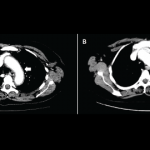 It’s been a short six years since the first immune checkpoint inhibitor (ICI) was approved by the U.S. Food and Drug Administration for the treatment of unresectable or metastatic melanoma.1 Today, a total of five treatments have been approved to fight advanced cancers, including renal cell carcinoma, non-small/small-cell lung cancer and Hodgkin’s lymphoma. And more ICIs are being investigated in clinical trials.2
It’s been a short six years since the first immune checkpoint inhibitor (ICI) was approved by the U.S. Food and Drug Administration for the treatment of unresectable or metastatic melanoma.1 Today, a total of five treatments have been approved to fight advanced cancers, including renal cell carcinoma, non-small/small-cell lung cancer and Hodgkin’s lymphoma. And more ICIs are being investigated in clinical trials.2
In some patients, ICI activation of the immune system can lead to serious side effects, also known as immune-related adverse events (irAEs). Many irAEs mimic rheumatic diseases, which makes for difficult diagnoses and treatment planning, according to Laura C. Cappelli, MD, MHS, a rheumatologist and instructor of medicine at Johns Hopkins University School of Medicine in Baltimore.
“We have a huge need to understand the scope of this problem, as well as the range of severity and various clinical courses and responses to treatment,” says Dr. Cappelli, whose research focuses on immunotherapy for cancer and inflammatory arthritis. “We don’t totally understand why irAEs occur and the biologic mechanism behind them. More importantly, we don’t understand completely all the biologic mechanisms by which immune checkpoint inhibitors fight cancer. Understanding how these drugs cause side effects that look like rheumatic disease could potentially give us insights into our own classic, rheumatic diseases and how these particular immune checkpoints may be relevant [to] the things we have known and studied for years. That is an exciting concept.”
Although research to fill the knowledge gaps is ongoing, Dr. Cappelli says clinicians should focus on rapid recognition of irAEs in their rheumatology patients with cancer. That starts with a full patient history and awareness of the five relevant ICI treatments: ipilimumab, nivolumab, pembrolizumb, avelumab and atezolizumab.2
“Beware the range of clinical presentations that occur after treatment with ICIs,” she says. “Inflammatory arthritis is common, but there are many other clinical presentations that look like classic rheumatic disease. [One example] is patients with severe dry mouth after taking oncology drugs. Make sure to raise the radar on immune-related evaluation, similar to a patient with suspected Sjögren’s syndrome or vasculitis or myositis—all of which have been reported after patients take these drugs.”3–8
Communication, with both the referring physician and the patient, is key.
“The oncologist needs to be on board with whatever your plan is for treatment. You need to know what the plan is for cancer treatment,” Dr. Cappelli says. “Also, include the patient in the shared decision-making with the oncologist. Patients have very different preferences for how they want to handle these adverse events. Some, mostly young people, want to go as long as they can on the ICI therapy and try symptomatic relief [for rheumatic conditions]. They want to stay on their cancer treatment even if their joints are swollen and painful. Other patients, especially if the immunotherapy is not working, may want to focus on quality of life and want to take immunosuppression to get rheumatic symptoms under control, even if it hypothetically could impair the cancer drug.”



